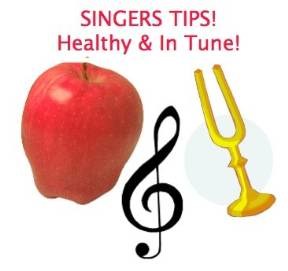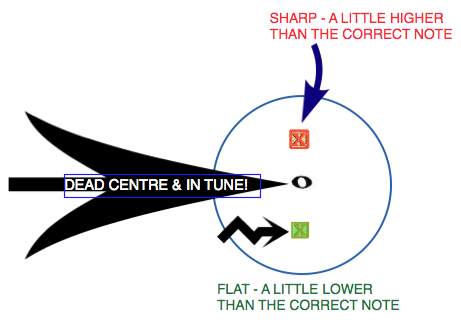Click for FREE newsletter & bonuses!
Tips On Singing Better Today!

One of the most Important Tips On Singing Better!
1. Are you "in tune?" What does it mean to sing "on pitch?"
In a nutshell, when I play a note that is easily within your singing range and ask you to sing that note, you are able to sing that same note back to me with ease.
I may also sing a note for you and the ask you to sing that same note back to me. If you are able to sing the same note that I have sung - you are singing "in tune." (Apparently, it is easier for most of us to correctly repeat a note that is sung to us rather than a note that is played to us on an instrument.)
Here is one way to depict the meaning of "singing in tune..."

As you will see, when you sing with the idea of repeating the same note that I have sung, it is possible to be absolutely "in tune" - like the centre black dot. However, some singers may sing a bit high/sharp (in red) or a bit low/flat (in green) - without knowing that they are not on pitch.
A good singer MUST be able to sing in that dead centre position - unless s/he has chosen to bend the note for an effect.
Now listen to this audio file to hear this in tune concept in action!
Tips On Singing Better...
the In-Tune Audio File. Singing in tune (or on pitch, which means the same thing) comes easily to many people who have a musical ear. But there are those who may be quite musical (they love music, appreciate music, can hear when others are out of tune....) but who still have a hard time singing in tune.
In those cases, there are exercises and various tricks that can help a person begin to hear themselves better. Sometimes, the issue that holds them back is purely technical. Sometimes it is emotional. Sometimes it is physical. Or a combination of the three. All of these kinds of problems can be carefully addressed - most often with good results.
One of my students sang in tune sometimes, but not always. We tried pitch-matching exercises and singing to and with one another. We tried a variety of other more technical exercises.

Finally, I asked him to sing to me with his well-tuned guitar pressed firmly against his body. And voila! His singing became much more accurate. Perhaps it was the effect of having the well-tuned guitar "sounding" against his body that did the trick.
Listening and hearing well are crucial to a singer. We need to take care of our hearing. But sometimes problems with hearing can be quite mysterious.
One of my new students feels that she is out of tune much the time, and that is not the case. My hope is that the more she sings and is offered positive feedback about her good tuning, the more her ear will come to understand which "sounds" are in tune and which sounds are not.
From the BBC news magazine (which now and then offers tips on singing better)...
"A very small proportion of the population are truly tone deaf," says Dr Daniel Mullensiefen of Goldsmiths University of London, co-creator of the BBC's new musicality test, which explores whether enthusiasm for music - rather than formal training alone - helps confer ability." Read more:
Can the tone deaf learn to sing?
I hope this singing tip was helpful to you.
I wish you great singing!
For much more helpful information for the beginning singer, visit my

Back from Tips On Singing Better to Singing Tips With Barbara Lewis

AFFILIATE PRODUCTS. Now and then, in my articles I recommend products that I believe in. If you buy something through one of those links, I receive a small commission. But there is no additional cost to you. Your purchase simply helps me to continue building this web site with free content.
Visit the Barbara's Vocal Guide Shop! E-Guides. Music.
Get Free Video Lessons with Barbara on her Youtube Channel








